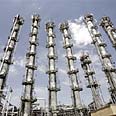
Before we bomb Iran
Israel should consider other options aside from hitting nuke sites
In response to Iran's insistence on continuing its nuclear project, which apparently includes the desire to acquire nuclear weapons, some are quick to beat the drums of war. They suggest that Israel initiate a military operation aimed at thwarting Iran's nuclear project.
Those backing this type of operation argue that an Iran armed with non-conventional weapons constitutes a tangible existential threat against Israel, particularly in the wake of President Ahmadinejad's comments regarding the need to erase Israel off the map. They identify a direct, necessary link here: Teheran seeks to equip itself with nuclear weapons – in order to erase Israel off the map.
Before this perception turns into an axiom that directs the manner in which Israel chooses to deal with Iran, we should consider some things.
The second Lebanon war proved that our leaders haven't learned a basic rule: Before adopting a wide-scale military initiative, we must first think about the day after. There's no need for a full state inquiry to realize that the decision to open the war did not stem from methodical thinking about its objectives and the ways in which it can advance new diplomatic initiatives. It appears that Von Clausewitz's remark that war is the continuation of policy by other means did not leave an impression on anyone among Israel's top political and military brass.
The questions at hand
Anyone seriously considering the option of attacking Iran's nuclear sites must address several major questions: Can we repeat the successful aerial assault on Iraq in 1981? This is highly doubtful. Iran's faculties are spread around various sites, with some built deep underground and protected by anti-aircraft batteries. Yet regardless of the results of such attack, it's clear Iran will responds the way Iraq did after it was hit: Its efforts to acquire nuclear arms will be boosted and the project as whole would not be foiled, but perhaps only delayed somewhat.
Another question: Will Iran show restraint, as Iraq chose to do, after the attack? Probably not. As opposed to Iraq, which at the time was in the midst of an all-out war with Iran and couldn't afford to open another front, Teheran is unconstrained. If it chooses to respond, Israel and the United States can expect some deep trouble. It's unclear at all whether Iran can be the target of a limited military operation. Iran is a country that is rich in resources and it has the ability to force Israel into a lengthy and painful military brawl, among other ways by using its allies in the Middle East.
In addition to a heavy human toll, the effect of such war on the Israeli economy could be most lethal. We must recall that the Iran-Iraq war lasted about eight years, exacted more than a million casualties on both sides, and was estimated to cost about USD 1.2 trillion.
Let world deal with Iran
If Iran indeed constitutes an existential threat on the entire Western world, as our leaders keep on saying, the world should be taking the imitative. It would be a mistake for Israel to take upon itself the role of a subcontractor for the West's military operations. Its willingness to fulfill this dubious post will only serve to boost the belief rampant in the Muslim world in general and in the Arab world in particular that Israel is a foreign element and a crusader fortress at the heart of the Middle East. This sill push away even further the chance of reaching comprehensive peace deals between Israel and its neighbors in the foreseeable future.
We are unable to tell whether a genuine willingness exists on the part of Western powers to thwart Iran's nuclear program through military means. The American desire to get tangled up in another military adventure in the area has likely cooled off considerably in the wake of the Iraqi mess. But if we assume that both Western countries and Israel accept the existence of Iranian nuclear arms, we should not conclude that all hope was lost.
We may need to change our thinking patterns and view the continued nuclearization of the Middle East as an inevitable development. We should also reexamine the axiom that the existence of nuclear arms in the hands of Iran (or any other Middle Eastern country) means, sooner or later, a nuclear attack on Israel.
The challenge would be to reach political agreements in the era of a nuclear balance of terror, with Israel not the only one in the region possessing non-conventional weapons. That is, Israel must think about ways to reach peace agreements based on mutual nuclear deterrence. This worked fairly well at other places and in other times, and could also work in the Middle East.
Many here would reject such scenario out of hand, guided by a perception regarding a sharp division between an enlightened and rational world (the West) and a dark, fundamental one (the Muslim Middle East). But those holding on to this perception are not thinking about the ironic fact that even if this simplistic and baseless division was accurate, Israel's conduct in the past three decades does not enable it to be attached to the enlightened and rational community of nations, particularly in light of the fundamentalist zeal that accompanied the settlement enterprise.
A culture war between East and West?
Therefore, the worldview that talks about a culture war between East and West, more than it contributes to the understanding of the conflict's nature and to bringing it closer to an end, works to perpetuate it. This perception always prefers the military option over the diplomatic one, because "there's nobody to talk to and nothing to talk about." And if it materializes, an attack on Iran's nuclear sites would constitute a terrible manifestation of that same apocalyptic, fateful doctrine.
Professor Yossi Yona is a lecturer at Ben Gurion University and a Senior Fellow at Jerusalem's Van Leer Institute










